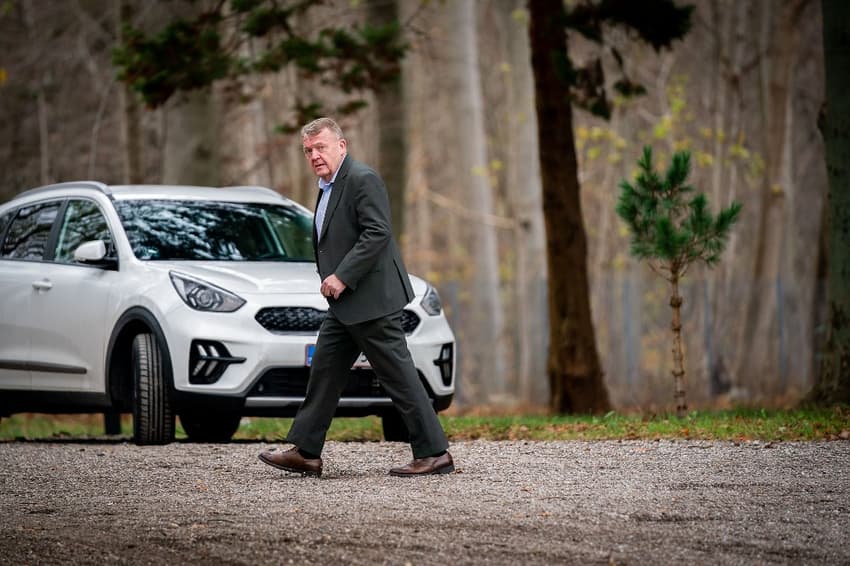Moderate party downplays importance of joining new Danish government

After another round of negotiations with acting Prime Minister Mette Frederiksen, Moderate leader Lars Løkke Rasmussen says it’s beside the point if his party joins Frederiksen’s vision of a ‘broad, central’ government.
Rasmussen, who was Prime Minister before Frederiksen when leader of the Liberal (Venstre) party, led the newly-formed Moderates into parliament in their first election on a platform of installing a centrist government.
The Moderates have a relatively strong hand in the negotiations with their 16 seats from 9.3 percent of the vote share in the election, which took place one month ago.
“For us, it’s not a separate ambition to be part of such a government,” Rasmussen said outside of the prime minister’s official residence at Marienborg on Wednesday.
“Whether we are in or not is less important. But we want to put ourselves in a position where we can influence the content. That’s what matters,” he said.
“It strikes me that Mette Frederiksen and I go a long way towards sharing the analysis of what’s good for Denmark,” he added.
READ ALSO: What does Denmark’s Liberal party want from government negotiations?
Rasmussen has previously backed a potential government involving the Social Democrats and Liberals along with the Moderates, calling it an “excellent starting point”.
But he said on Wednesday that his party could lend support to a central coalition without being part of the government itself.
The Moderates could be influential “by forming the parliamentary basis for a government which consists of parties from both sides of the infamous political centre,” he said.
Although the centrist party is heavily involved in talks led by Frederiksen, it does not have decisive seats which could give either the left or right wings an overall majority. The left wing ‘red bloc’ took a single-seat victory in the November 1st election, meaning a left-wing government could be formed without the support of the Moderates.
But Frederiksen has eschewed the option of a government reliant on the support of the parties furthest to the left, the Red Green Alliance and Alternative, maintaining her pre-election pledge to seek a coalition across the centre.
There is no majority which could put a ‘blue bloc’ or conservative government in place.
READ ALSO: Five things to know about the Danish election result
Comments
See Also
Rasmussen, who was Prime Minister before Frederiksen when leader of the Liberal (Venstre) party, led the newly-formed Moderates into parliament in their first election on a platform of installing a centrist government.
The Moderates have a relatively strong hand in the negotiations with their 16 seats from 9.3 percent of the vote share in the election, which took place one month ago.
“For us, it’s not a separate ambition to be part of such a government,” Rasmussen said outside of the prime minister’s official residence at Marienborg on Wednesday.
“Whether we are in or not is less important. But we want to put ourselves in a position where we can influence the content. That’s what matters,” he said.
“It strikes me that Mette Frederiksen and I go a long way towards sharing the analysis of what’s good for Denmark,” he added.
READ ALSO: What does Denmark’s Liberal party want from government negotiations?
Rasmussen has previously backed a potential government involving the Social Democrats and Liberals along with the Moderates, calling it an “excellent starting point”.
But he said on Wednesday that his party could lend support to a central coalition without being part of the government itself.
The Moderates could be influential “by forming the parliamentary basis for a government which consists of parties from both sides of the infamous political centre,” he said.
Although the centrist party is heavily involved in talks led by Frederiksen, it does not have decisive seats which could give either the left or right wings an overall majority. The left wing ‘red bloc’ took a single-seat victory in the November 1st election, meaning a left-wing government could be formed without the support of the Moderates.
But Frederiksen has eschewed the option of a government reliant on the support of the parties furthest to the left, the Red Green Alliance and Alternative, maintaining her pre-election pledge to seek a coalition across the centre.
There is no majority which could put a ‘blue bloc’ or conservative government in place.
READ ALSO: Five things to know about the Danish election result
Join the conversation in our comments section below. Share your own views and experience and if you have a question or suggestion for our journalists then email us at [email protected].
Please keep comments civil, constructive and on topic – and make sure to read our terms of use before getting involved.
Please log in here to leave a comment.